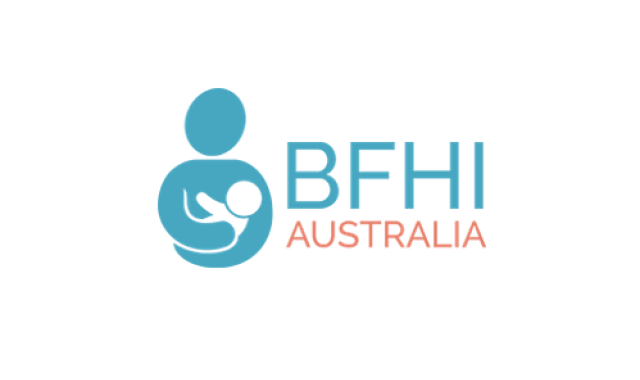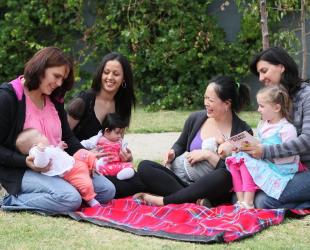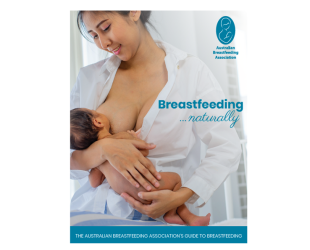Are you planning to have your baby in a hospital?
Choose a Baby Friendly accredited hospital if you can.

Attending a Baby Friendly accredited hospital will give you a better chance of successfully establishing breastfeeding and going on to exclusively breastfeed your baby for a longer period of time.
What is BFHI?
The Baby Friendly Hospital Initiative (BFHI) is a joint UNICEF and the World Health Organization (WHO) project that aims to give every baby the best start in life by creating health care environments where breastfeeding is the norm. In Australia, the project is known as the Baby Friendly Health Initiative.
The BFH initiative makes sure that practices known to promote the health and wellbeing of all women and babies are followed in hospitals and other health care facilities. ‘Baby Friendly’ accreditation is a quality assurance measure that demonstrates a commitment by the facility to offer the highest standard of maternity care.
To be accredited as ‘Baby Friendly’, hospitals must comply with the global standard, 'Ten Steps to Successful Breastfeeding', established by WHO and UNICEF:
Critical management procedures:
Step 1a. Comply fully with the International Code of Marketing of Breast-milk Substitutes and relevant World Health Assembly resolutions.
Step 1b. Have a written infant feeding policy that is routinely communicated to staff and parents.
Step 1c. Establish ongoing monitoring and data-management systems.
Step 2. Ensure that staff have sufficient knowledge, competence and skills to support breastfeeding.
Key clinical practices:
Step 3. Discuss the importance and management of breastfeeding with pregnant women and their families.
Step 4. Facilitate immediate and uninterrupted skin-to-skin contact and support mothers to initiate breastfeeding as soon as possible after birth.
Step 5. Support mothers to initiate and maintain breastfeeding and manage common difficulties.
Step 6. Do not provide breastfed newborns any food or fluids other than breast milk, unless medically indicated.
Step 7. Enable mothers and their infants to remain together and to practise rooming-in 24 hours a day.
Step 8. Support mothers to recognize and respond to their infants’ cues for feeding.
Step 9. Counsel mothers on the use and risks of feeding bottles, teats and pacifiers.
Step 10. Coordinate discharge so that parents and their infants have timely access to ongoing support and care.
Step 10 is where the Australian Breastfeeding Association comes in. Baby Friendly hospitals in Australia have a good working relationship with local ABA groups and provide ABA literature to women when they leave hospital. In this way, you can continue to be well-supported in your breastfeeding for the following months and years.
Who benefits from Baby Friendly?
-
Consistent care, information and advice. Staff in maternity and paediatric units have a written policy, which they understand and follow.
-
Early bonding between mother and baby. Skin-to-skin physical contact immediately after birth in peace, without any unnecessary disturbance, allows psychological adaptation as well as colonisation of the infant's skin with the normal skin flora of the mother.
-
Consistent and skilled help with breastfeeding. Staff are required to be able to support women who wish to breastfeed.
-
Early initiation of breastfeeding. Babies are not unnecessarily removed from mothers at birth, thereby encouraging the instinctive seeking and suckling behaviours. When mother and baby need to be separated the mother is helped with expressing her milk and the expressed milk is given to the baby.
-
Mother's milk is valued. No food or drink other than breastmilk is given.
-
Breastfeeding is valued. Artificial teats and dummies are avoided.
-
Empowerment. The woman has authority for her own resource: breastfeeding.
-
Increased breastfeeding knowledge and skill.
-
Increased professional competence, as practices are investigated and challenged and changes are made.
-
Increased satisfaction and empowerment, as staff actively participate in reaching and maintaining the best standard of care knowing that the benefits of breastfeeding are life-long.
-
Enhanced respect for the woman, the baby and their ability to breastfeed when given appropriate support.
-
As the care is woman-centred rather than task-centred, all staff respect the woman's need for consistent advice and empowerment, thereby increasing cooperation and collaboration between staff members.
-
A high standard that is measured by the unit and confirmed by the Baby Friendly assessment team representing professional and lay assessors.
-
A Global standard recognised and respected by professionals and consumers around the world.
-
A quality measure that can be used to market the hospital or unit services.
-
Considerable monetary savings through reduced reliance on breastmilk substitutes and separate nursery care for well babies.
-
The relationship between the mother and baby is protected, as the mother better understands and responds to her child, is more satisfied in her role as a mother.
-
Health and development of the infant are enhanced.
-
Health of the mother is also protected.
-
Cost saving immediate (breastmilk is free) and long term (reduced incidence of illness).
-
Recognition of the importance of breastfeeding flows on from the family.
-
An increased level of respect for human rights of both women and children, in ensuring access to a normal standard of health through BFHI's support of breastfeeding.
-
Environmental considerations: breastfeeding has no waste products and no environmental degradation is involved in its production.
-
Economic considerations: reduced cost to employers from parents required to care for ill children as there is less risk of illness and disease in breastfed children. Reduced cost to scarce health-funding due to lower incidence of illness and disease in breastfed children and lower incidence of certain cancers in women who have breastfed.
In Australia, the Baby Friendly Health Initiative is administered by the Australian College of Midwives. The BFHI-accredited assessors and educators are also ABA breastfeeding counsellors, lactations consultants, midwives, nutritionists and doctors.
So for your next baby, if you are birthing in a hospital or birth centre, ask the staff whether the hospital is Baby Friendly accredited. If the hospital is not accredited, you might like to ask them when they hope to achieve this quality measure!
Find out more about BFHI in Australia, including a list of accredited hospitals in each state and territory.
© Australian Breastfeeding Association May 2022

My breastfeeding plan

Connect with other mums

Breastfeeding... naturally
Your guide to breastfeeding. Over 200 pages of must-have info for the first year of your baby's life.